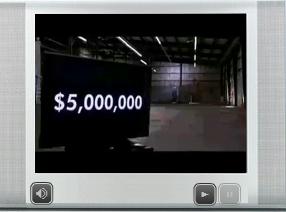 Joe Lieberman's continued use of Karl Rove's tactics in his TV ads is astounding.
Joe Lieberman's continued use of Karl Rove's tactics in his TV ads is astounding. "Blame the other guy for stuff I'm doing myself" seems to be the overriding theme here.
In his latest crap-tossing-fest, our junior Senator alleges that Ned Lamont's family fortune has "up to $5 million invested" in a "firm whose companies ship jobs overseas."
Maybe like Halliburton, of which Joe Lieberman himself had quite a few shares until he embarrassed himself by pointing out Ned's much smaller investment and then Joe had to divest himself of it.
Yeah, Joe caught himself with that allegation.
Or the contributions he accepted from Wal-Mart and meekly claimed that he returned so he could posture at the "Wake Up Wal-Mart" rally in Bridgeport this summer.
So, let's talk about investing in American jobs.
Joe voted in favor of NAFTA. That's the North American Free Trade Agreement.
According to the Economic Policy Institute (link):
Since the North American Free Trade Agreement (NAFTA) was signed in 1993, the rise in the U.S. trade deficit with Canada and Mexico through 2002 has caused the displacement of production that supported 879,280 U.S. jobs. Most of those lost jobs were high-wage positions in manufacturing industries.And the report also had THIS to say about the results of Joe Lieberman's support of NAFTA:
The loss of these jobs is just the most visible tip of NAFTA's impact on the U.S. economy.So, while Joe Lieberman is picking through the investments of an estimated $300 million family fortune that has CREATED wealth and jobs, his vote for NAFTA has cost us almost a MILLION JOBS.
Thanks for caring, Joe.
1 comment:
Well, Joe needs to account for what interests he and his wife have with lobbyists. This link to a Conaston piece, http://www.salon.com/opinion/conason/2006/09/01/hadassah_lieberman/ , clearly has some troubling implications.. The biggest being that the Lieberman's are fast-tracking prescription drug legislations that are even more costly to consumers than anything the Republicans have sponsored.
from the article; In bed with Big Pharma by Joe Canaston, "Among Hill & Knowlton's clients when Mrs. Lieberman signed on with the firm last year was GlaxoSmithKline, the huge British-based drug company that makes vaccines along with many other drugs. As I noted in July, Sen. Lieberman introduced a bill in April 2005 (the month after his wife joined Hill & Knowlton) that would award billions of dollars in new "incentives" to companies like GlaxoSmithKline to persuade them to make more new vaccines. Under the legislation, known as Bioshield II, the cost to consumers and governments would be astronomical, but for Lieberman and his Republican cosponsors, Sen. Orrin Hatch, R-Utah, and Sen. Sam Brownback, R-Kan., the results would be worth every penny. Using the war on terror as their ideological backdrop, the pharma-friendly senators sought to win patent extensions on products that have nothing to do with preparations against terrorist attack or natural disaster.
As the New Haven Register, Lieberman's hometown newspaper, noted in an editorial headlined "Lieberman Crafts Drug Company Perk," that bill is even more generous to the pharmaceutical industry than a similar proposal by the Senate Republican leadership. "The government can offer incentives and guarantees for needed public health measures," it said. "But it should not write a blank check, as these bills do, to the pharmaceutical industry that has such a large cost to the public with what may be an uncertain or dubious return."
What the editorial didn't mention was that the Lieberman bill had also been written by Chuck Ludlam, a former pharmaceutical industry lobbyist who then worked on the Connecticut senator's staff. From his office to his bedroom, Lieberman was totally surrounded by current and former employees of Big Pharma. Ludlam has since retired, and Mrs. Lieberman has quit her job too -- but Lieberman still looks like a politician wholly owned by one of the nation's most troublesome special interests. And while his campaign may not believe that the moralizing senator should he held accountable for those dubious relationships, the press and the public may think otherwise."
The drug company perk is called "wild-card exclusivity" and it allows drug companies to monopolize expensive products for longer periods of time keeping generic equivalents OFF the market. Bush isn't the only one kissing Joe.
Post a Comment